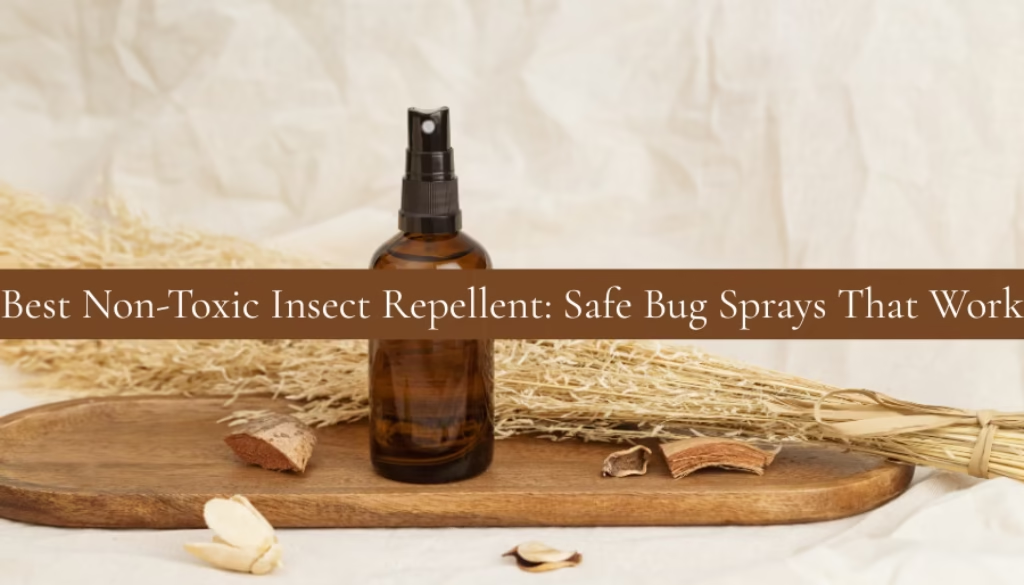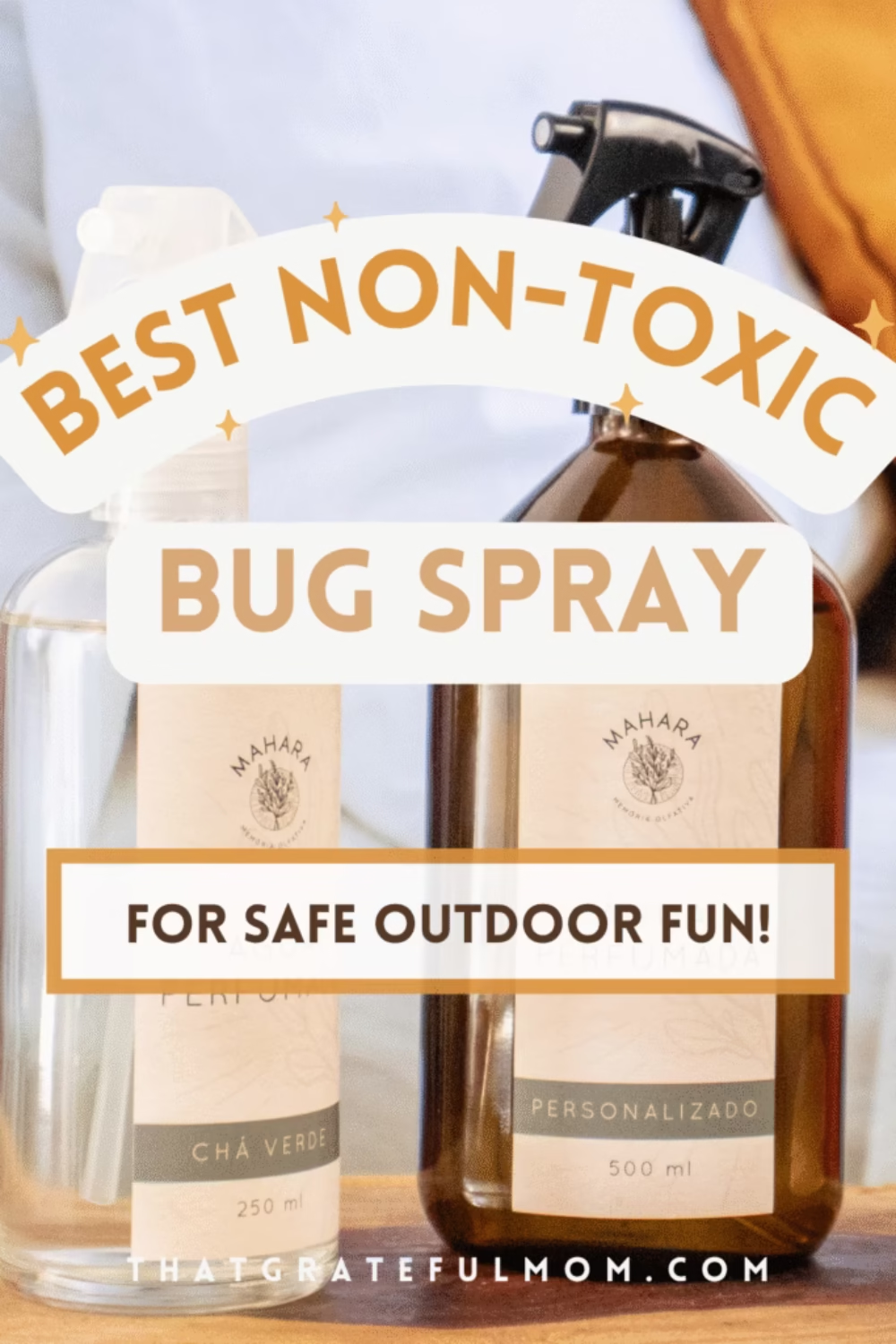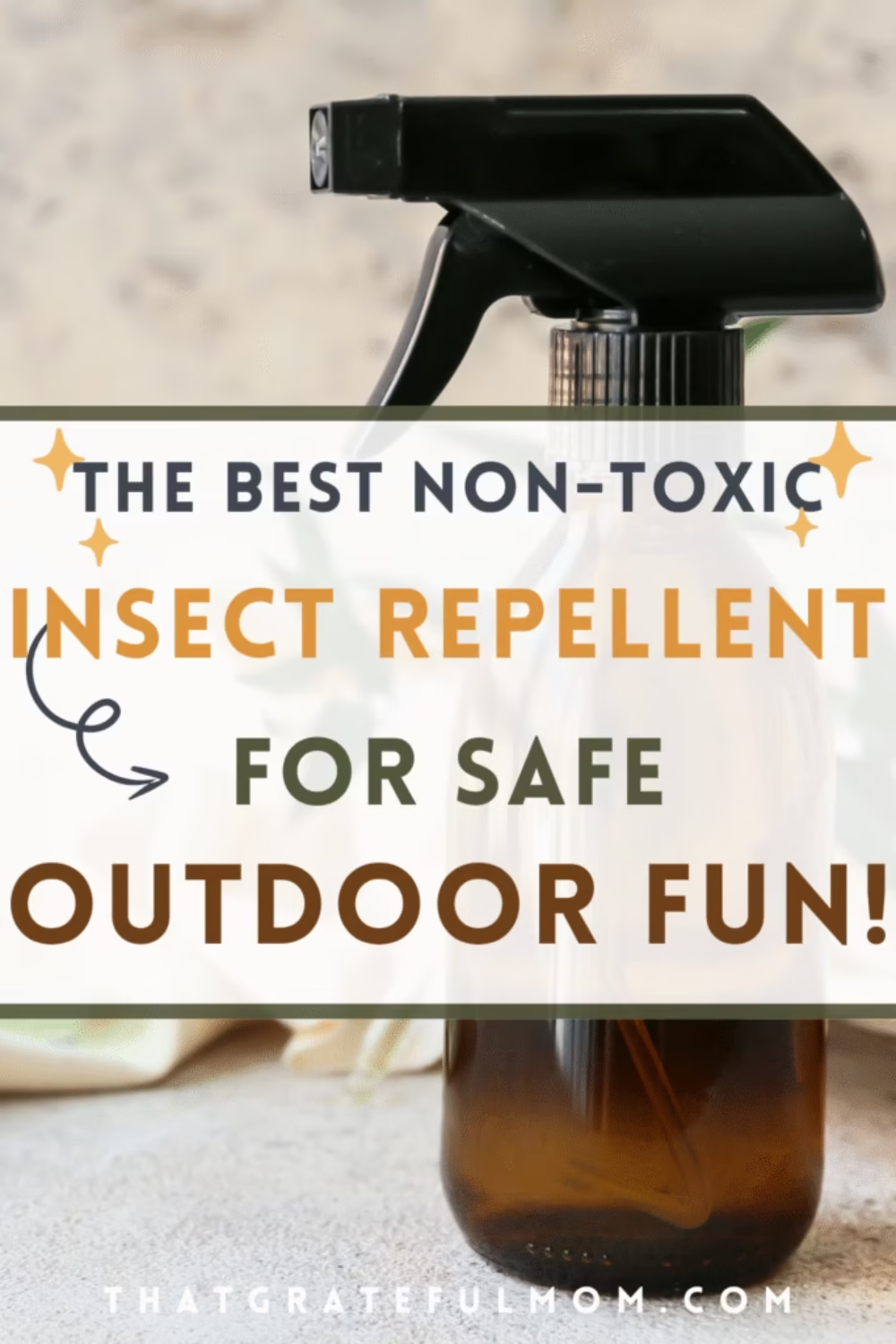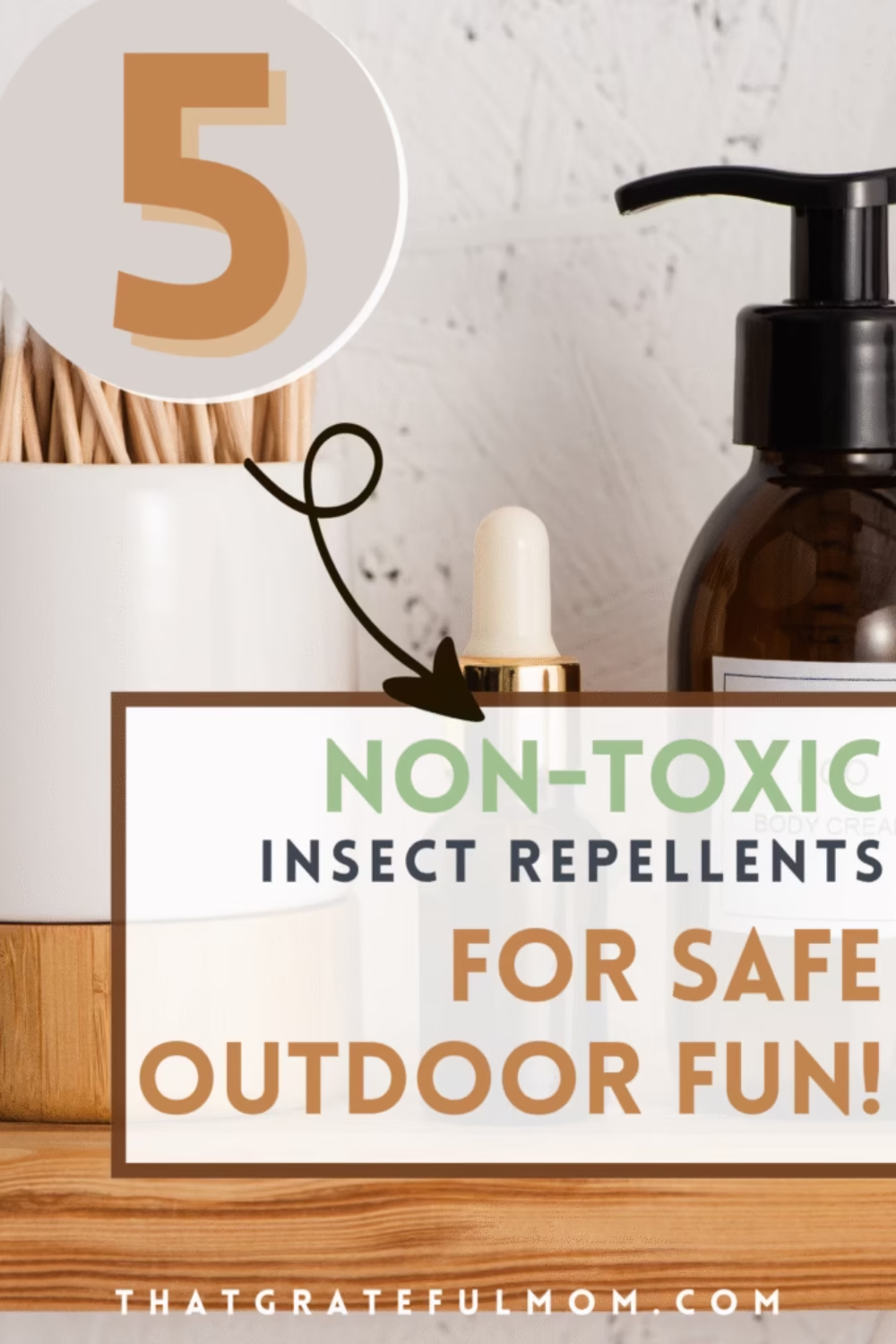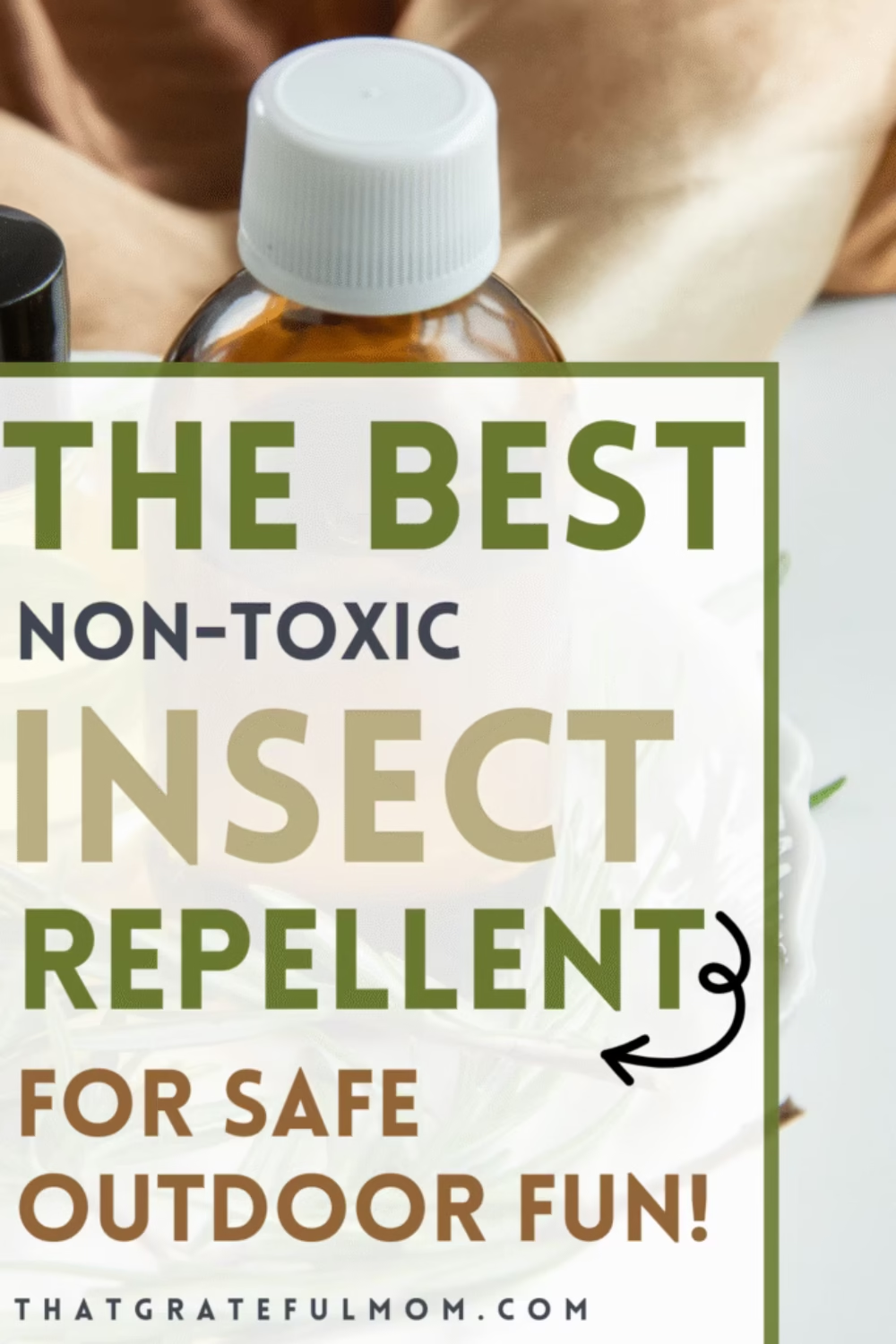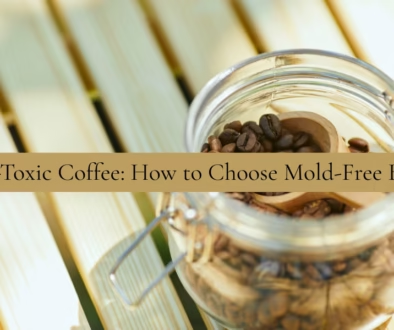Best Non-Toxic Insect Repellent: Safe Bug Sprays That Work
As the weather warms up, we spend more time outside, and so do mosquitoes, ticks, and other pests. Whether you’re hiking, gardening, camping, or just enjoying dinner on the patio, having the best non-toxic insect repellent available is a must. But many bug sprays are packed with harsh or synthetic chemicals that can cause skin irritation or raise a health concern, especially for young children, pregnant women, and people with sensitivities.
That’s why I’ve made the switch to the best non-toxic insect repellent options I can find. In this guide, I’ll walk you through the safest repellent ingredients, what to avoid, the best clean bug sprays on the market, and even share a simple DIY recipe you can make at home using natural ingredients and essential oils.
Why I Avoid Conventional Bug Sprays
The most common repellent chemical in traditional bug sprays is DEET (N,N-Diethyl-meta-toluamide). While it’s known for long-lasting protection, it’s not without drawbacks. DEET can cause skin irritation and has raised nervous system concerns in animal studies. Higher concentrations of DEET may also increase the risk of toxic exposure in young children.
Even though the Environmental Protection Agency and World Health Organization have both declared DEET safe when used correctly, I prefer natural bug spray options that offer effective protection with fewer potential side effects.
Natural insect repellents made with plant-based ingredients like lemon eucalyptus oil, citronella oil, and peppermint oil provide a high level of protection without the harmful chemicals. These botanical repellents are a good option for the whole family, especially if you’re concerned about allergic reactions, skin sensitivity, or long-term exposure to synthetic chemical ingredients.
Ingredients to Avoid in Bug Repellents
If you’re transitioning to natural products or trying to reduce your family’s toxic load, pay attention to the product label. Watch out for:
-
DEET: While it’s effective, higher concentrations may lead to more severe reactions. Percent DEET in many commercial sprays ranges from 5% to 100%.
-
Picaridin: Some percent picaridin formulas are a safer alternative to DEET, but they’re still synthetic. The concentration of picaridin matters—lower concentrations are less irritating.
-
Synthetic Fragrance: Often includes phthalates, which are known endocrine disruptors.
-
Aerosol Sprays: These may worsen respiratory conditions and aren’t environmentally friendly.
-
Parabens & Preservatives: Linked to allergic reactions and hormone disruption.
Natural Ways to Protect Against Bug Bites
Using a natural insect repellent is a great start, but you can increase protection by adjusting your daily habits. These methods help repel mosquitoes and ticks, reducing the risk of mosquito bites and tick-borne diseases like Lyme disease and West Nile virus.
Cover Up When You Can
Lightweight long pants, sleeves, and closed shoes form the first line of defense. Light-colored clothing is better since mosquitoes are more attracted to dark colors.
Eliminate Standing Water
Mosquitoes lay eggs in stagnant water. Check for birdbaths, buckets, gutters, and toys that hold water—even a short time is long enough to attract bugs.
Use Mosquito Netting
Sleeping outdoors? Netting is one of the most effective physical mosquito repellents. Use it over strollers, hammocks, and sleeping bags.
Avoid Peak Hours
Mosquitoes are most active around dawn and dusk. Try to limit outdoor time during these hours or reapply repellent before heading out.
Keep Outdoor Spaces Tidy
Overgrown shrubs and tall grass are bug magnets. Regularly mow your lawn and trim back brush, especially near woods or water.
Use Outdoor Fans
Mosquitoes are weak fliers. A basic fan on your deck or porch makes a huge difference in a matter of seconds.
Protect Babies and Toddlers
Young children have the most sensitive skin. Use kid-safe formulas and avoid applying essential oils directly. Use mosquito netting and long sleeves instead.
My Top Picks for the Best Non-Toxic Insect Repellents
These natural bug sprays use botanical ingredients and offer complete protection without the harsh chemicals. Here are my personal favorites:
Murphy’s Naturals Lemon Eucalyptus Oil Insect Repellent
-
Main ingredient: Oil of Lemon Eucalyptus (30%)
-
Why I like it: EPA-registered repellent that uses a plant-based active. Pump spray design is convenient.
-
Protection time: Up to 6 hours
-
Best for: Hiking, camping, outdoor gatherings
Wondercide Insect Repellent Spray
-
Main ingredients: Cedarwood, lemongrass oil, and sesame oils
-
Why I like it: Natural ingredients and safe for pets. No harmful or inactive ingredients.
-
Best for: Homes with pets, gardens, and daily use
Badger Anti-Bug Shake & Spray
-
Main ingredients: Citronella oil, rosemary, and lemongrass oil
-
Why I like it: USDA Organic and safe for young children. DEET-free bug spray with solid performance.
-
Best for: Short trips, yard play, or light activity
California Baby Bug Repellent Spray
-
Main ingredients: Citronella oil, lemongrass oil, and cedar
-
Why I like it: Gentle on the most sensitive skin. Designed with pregnant women and babies in mind.
-
Best for: Infants and toddlers
Kinfield Golden Hour DEET-Free Repellent
-
Main ingredients: Citronella, clove oil, and lemongrass oil
-
Why I like it: Smells amazing, deet-free, and feels clean—not greasy.
-
Best for: Backyard barbecues and everyday errands
Aunt Fannie’s Mosquito Spray + Wipes
-
Main ingredients: Citronella oil, peppermint oil, and lemongrass oil
-
Why I like it: EWG-verified. Wipe format is super handy for kids and travel.
-
Best for: Parks, diaper bags, glove compartments
Sky Organics Organic Bug Spray
-
Main ingredients: Soybean oils, citronella, peppermint, rosemary
-
Why I like it: USDA Organic, free from synthetic chemicals, and works well for the whole family.
-
Best for: Organic households and outdoor play
Powerful Natural Ingredients That Repel Bugs
Some of the best bug repellents rely on these natural ingredients:
-
Oil of Lemon Eucalyptus: Recognized by the Environmental Protection Agency for effective protection. Offers a high level of protection comparable to low percent DEET products.
-
Citronella Oil: Derived from the citronella plant, it helps mask human scent.
-
Lemongrass Oil: Known for its pleasant scent and mosquito repelling properties.
-
Peppermint Oil: Works against mosquitoes, ants, and spiders.
-
Clove Oil: Provides longer protection than citronella in some studies.
-
Tea Tree and Thyme Oil: Both offer antibacterial properties and are effective mosquito repellents.
-
Coconut Oil: Often used as a base to dilute essential oils and add moisture.
-
Garlic Oil: Natural deterrent against ticks and mosquitoes.
DIY Natural Bug Spray Recipe
Prefer to make your own? This natural recipe avoids dangerous chemicals and is safe for daily use.
Ingredients:
-
1/2 cup witch hazel (or vodka)
-
1/2 cup distilled water
-
1 tablespoon apple cider vinegar
-
10 drops citronella oil
-
10 drops lemongrass oil
-
10 drops lemon eucalyptus oil
-
5 drops tea tree oil
-
5 drops lavender oil
-
1 tsp vegetable glycerin or fractionated coconut oil
Instructions:
-
Add ingredients to a 4 oz spray bottle.
-
Shake well before each use.
-
Spray on clothing and exposed skin. Avoid eyes and mouth.
-
Reapply every 1–2 hours or after heavy sweating.
How to Use Natural Bug Sprays for Complete Protection
To get the most out of your non-toxic insect repellent:
-
Apply liberally to exposed skin and outerwear
-
Reapply after sweating or swimming
-
Shake the spray bottle before use to redistribute oils
-
Avoid applying essential oils directly to sensitive skin areas
-
Store in a cool place for longer shelf life
- Pair with non-toxic sunscreen for sun and insect protection
Choosing the Right Natural Bug Spray
Here are a few tips to help you choose the best non-toxic insect repellent for your family:
-
Check for EPA registration (especially for lemon eucalyptus oil)
-
Read the product label to verify botanical repellents and avoid harmful ingredients
-
Match concentration to activity—longer hikes require stronger formulas
-
Opt for pump spray or wipe formats for safer application
-
Consider who’s using it—some oils are not safe for infants or pregnant women
FAQs
Is lemon eucalyptus oil safe for kids?
Yes—for kids over 3. The American Academy of Pediatrics advises against use in younger children.
Can I use these sprays on pets?
Only if the product is labeled pet-safe. Some essential oils can be toxic to animals.
Do natural repellents work as well as DEET-based sprays?
Yes, especially those with oil of lemon eucalyptus. While they may require more frequent application, they provide comparable results without the drawbacks of a deet formula.
How often should I reapply?
Most natural sprays require reapplication every 2–3 hours or after water exposure.
What if I have a reaction?
Stop using immediately. Rinse with water and apply hydrocortisone cream. Seek medical care if symptoms persist.
Final Thoughts
Choosing the best non-toxic insect repellent means looking for natural ingredients, clean formulations, and thoughtful application methods. Whether you’re trying to avoid mosquito bites on a Rocky Mountain trail or protect your kids in New Hampshire during tick season, there are good alternatives that don’t rely on dangerous chemicals.
Look for deet-free bug spray that includes oil of lemon eucalyptus, citronella oil, and other plant-based ingredients. Whether you need a tiny bottle for travel or a family-sized spray for weekend hikes, there’s a good choice out there for everyone.
And remember: no repellent is perfect. Pair it with common-sense practices like long pants, netting, and tidy yards for full protection against vector-borne disease.
This site may contain links to affiliate websites including Amazon. I may receive an affiliate commission for any purchases made by you through Amazon or other potential affiliates and no additional cost to you. Thank you for your support.

